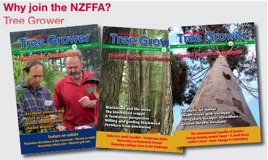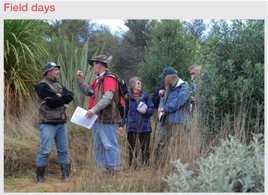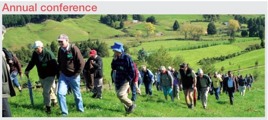Practise good forest hygiene if you are travelling overseas
Author not published, New Zealand Tree Grower May 2009.
New Zealand’s exotic forest estate is worth billions of dollars. Last year the NZ Forest Owners Association issued forest hygiene guidelines for members to enlist their cooperation in reducing any risk of accidental introduction of new pests or diseases that could endanger this valuable resource. As farmers and foresters we are sure that NZFFA members are aware of the need to maintain strict biosecurity to protect our primary industries from potentially catastrophic plants and diseases. However these guidelines make good sense for farm foresters travelling overseas or hosting overseas visitors.
Soil-borne pathogens
As a remote and insular country, New Zealand is free of many forest diseases such as conifer rusts and pitch canker which cause considerable losses in other parts of the world. However many pathogens of forest trees produce large numbers of spores which, if dry, can remain infective for very long periods. Soil-borne pathogens can also remain infective in small volumes of soil.
Spores can stick to clothing, fragments of plant material bearing fruit bodies of pathogenic fungi can be lodged in pockets or other parts of apparel, and the soil sticking to footwear can carry soil-borne pathogens. Visitors to our forests may subconsciously become vectors of organisms that cause disease.
What to do
Measures to reduce the chances of such diseases reaching New Zealand are made by the regulatory authorities and there is an active biosecurity programme operating at the borders. In addition to these, and to further minimise the risks to our forests, the Forest Owners Association now also require international visitors and forest staff returning from overseas comply with the following guidelines –
- Before entering New Zealand, clean any clothing and footwear worn during nursery, forest, port or processing site visits. Dry cleaning is an effective method of killing fungal spores on clothing. Boots and shoes can be brushed clean of all dirt and plant fragments. In addition the soles should be treated with a biocide solution such as Varicide or hypochlorite
- Clean any sports equipment such as boots and golf clubs ensuring any soil is removed
- Tents and sleeping bags are high hazard items so make sure they are clean and free of soil
- Any field equipment that has been used in forests overseas, such as pocket knives or pruners, should be wiped clean with a biocide or disinfectant.This also applies to cameras and binoculars. Camera and binocular cases should be checked for plant fragments and the interior and exterior wiped clean.
Please notify MAF border security staff of these items and of your involvement in forestry. As an extra precaution, before entering New Zealand forests, you may be asked to submit footwear for a brief further treatment. This will not damage boots and the compounds used have extremely low toxicity. No clothing or footwear worn overseas should be worn in New Zealand forests until these standards are complied with.

 Farm Forestry New Zealand
Farm Forestry New Zealand

